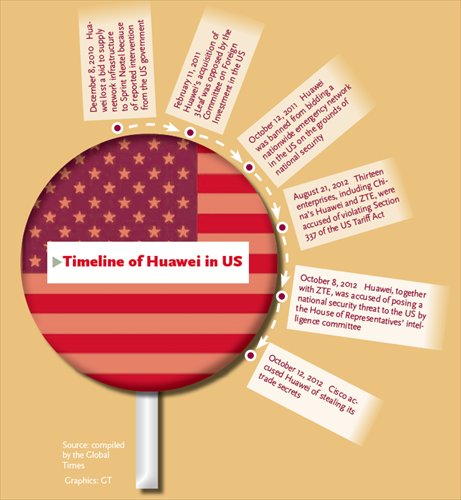Huawei exiting US market: CEO

Timeline of Huawei in US Source: compiled by the Global Times Graphics: GT
Chinese telecommunications equipment maker Huawei Technologies Co Ltd has exited the US market in order not to affect Sino-US relations, Ren Zhengfei, founder and CEO of Huawei, said in an interview in Paris, news portal 163.com reported Sunday.
As a private enterprise, Huawei has no political stance and has done well after retreating from the US market, Ren said in the interview when he was asked about Huawei's relationship with the Chinese government, according to the report.
Although Huawei has retreated from the US market in terms of telecommunications equipment, phones made by Huawei still sell well in the US, Ren said, noting the cellphones cannot be viewed as security threats because the cellphones run software made by the US.
Huawei's development in the US was not smooth.
In February 2011, Huawei was foiled in its acquisition of US company 3Leaf.
One year later, the company was accused of violating Section 337 of the US Tariff Act.
Then on October 8, 2012, the US Congress released a report claiming that Huawei and ZTE, another Chinese telecommunications equipment maker, had helped Chinese intelligence infiltrate the communications networks in the US.
In March this year, the US government banned government departments from buying information technology equipment from Chinese companies.
Xu Zhijun, executive vice president of Huawei, said back in April that Huawei was not interested in the US market any more, news portal techinasia.com reported in October.
In addition to the obstacles encountered in the US market, Huawei was banned by Australia's newly elected government from bidding for its National Broadband Network, worth $38 billion.
A PR staff member of Huawei ,when contacted by the Global Times Sunday, said statistical information about Huawei's overseas business could not be provided since it was the weekend.
Retreating from the US was a choice made under the current market environment, He Weiwen, co-director of the China-US-EU Study Center under the China Association of International Trade, told the Global Times Sunday.
However, it does not mean that Huawei has lost the US market permanently, He said, noting man-made barriers cannot last long in globalization, especially for the telecommunications industry.
According to a report on techinasia.com, Huawei has done well in Asia, Africa and Europe, with its main international markets comprising 19 countries and regions, and one-third of the population in 140 countries and regions using its products.
Some countries, such as the US, have a stereotypical view of Chinese companies, believing they are backed by the government, and Chinese companies have to face the fact that it is hard to break this perception, Bai Ming, a research fellow at the Chinese Academy of International Trade and Economic Cooperation, told the Global Times Sunday.
Chinese enterprises that expect to explore the overseas markets should be aware of the barriers they may encounter, including barriers of technologies, tariff and politics, Bai said.
Huawei has set a good example for other Chinese firms in overseas development, He said, noting that Huawei has two main advantages: a professional team well-versed with core technology and localized talents.
Huawei has utilized a localization strategy, He Weiwen said, noting Huawei hired local talents for its high-level management, helping Huawei become a global enterprise rather than just a Chinese one.
Huawei's best strategy is to keep developing advanced technology, according to Bai.
Zhang Zhilong contributed to the story